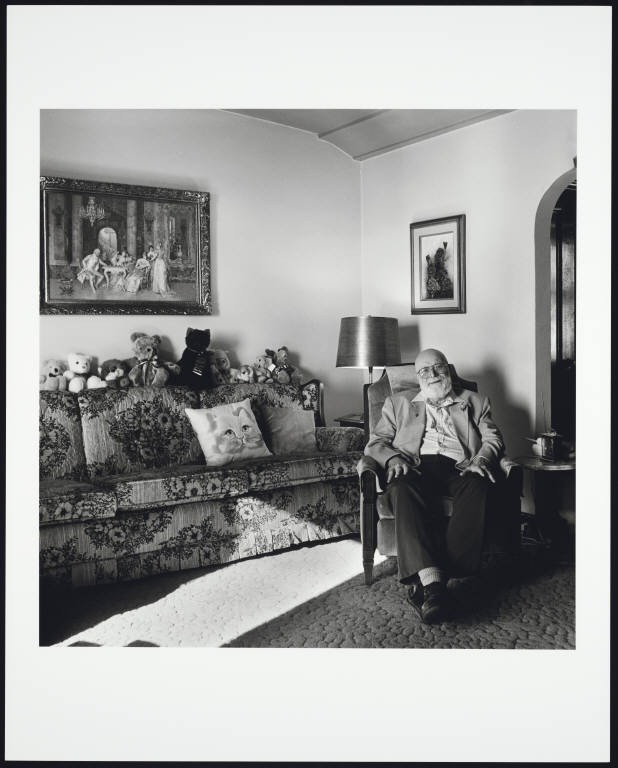Partner Tony Reyes
Queer Places:
California Hall, 625 Polk St, San Francisco
 Donald
Stewart "Don" Lucas (1926 - September 22, 2003) was born in rural Colorado in 1926, but moved to San Francisco in 1949, performing in local theater until the middle 1950s.
This was the time when he met his long-time partner,
Tony Reyes; Reyes was 16 and Lucas
19.
Donald
Stewart "Don" Lucas (1926 - September 22, 2003) was born in rural Colorado in 1926, but moved to San Francisco in 1949, performing in local theater until the middle 1950s.
This was the time when he met his long-time partner,
Tony Reyes; Reyes was 16 and Lucas
19.
In San Francisco Lucas was introduced to the Mattachine Society and the idea of homosexual education and activism. An acquaintance invited Lucas to a meeting of a San Francisco chapter of the recently re-formed Mattachine Society in mid-1953. In November 1953, Lucas attended a Constitutional Convention of the Society in Los Angeles and from that point in time became progressively more involved in the organization. As the leadership of the Society migrated from southern to northern California, Lucas assumed greater leadership responsibilities. In 1954, Lucas was a representative of the San Francisco Area Council and in 1955 he moved into the position of chair of the Society's Legal-Legislative Committee. Beginning in 1955, he also worked with
Hal Call on publishing the Mattachine Review in the position of Business Manager. During that time, he kept the books for the publishing company he founded with Hal Call, but spent most of his time performing what he called "lay counseling" for the Society. This activity included working with individuals who contacted the Society with a whole variety of problems relating to employment, housing, civil rights, arrests, family, gender identity, and psychology at a time when the San Francisco homophile movement experienced a period of significant growth.
Lucas played an important role in helping to found the Council on Religion and the Homosexual (CRH) in 1964. CRH was an outgrowth of several San Francisco-based homophile organizations: the Mattachine Society, the Daughters of Bilitis, and the League for Civil Education, as well as the Glide Memorial Center. Since the late 1950s, one goal of these organizations was to build alliances with liberal, mostly Protestant, ministers with hopes that they would become allies in the fight for homosexual civil rights.The organization of CRH dates to June, 1964, when a two-day Consultation on The Church and the Homosexual was held at the White Memorial Retreat Center in Mill Valley, California. The Consultation was sponsored by the Glide Foundation, two other agencies of the Methodist Church, and several homophile organizations. Lucas attended this Consulation and addressed the group as a spokeperson for gay male concerns.

by
Robert Giard
Lucas was also one of the organizers of the New Year's Day Mardi Gras Ball of 1965 that greatly increased the visibility of CRH. This Ball, held at California Hall on Polk Street, was a fundraiser for CRH and was sponsored by the city's homophile organizations. Although all the proper permits had been obtained, the members of the San Francisco Police Department photographed and otherwise harassed attendees; they also arrested several ministers, lawyers, and a housewife for supposedly interfering with police work. The behavior of the police backfired and, with the help of the CRH clergy, the event turned into an extremely important public relations coup not only for CRH, but for San Francisco homosexuals in general.
As Lucas's interest in social services and counseling increased in the middle 1960s, he was exposed not only to homosexuals in need, but to others (like runaway youth, hustlers, drug addicts, the elderly, and transgender youth) in the Tenderloin and South of Market area who were confronted with a variety of problems. As part of the Johnson Administration's antipoverty programs, the Economic Opportunity Council was formed in San Francisco to distribute grants and establish neighborhood-based programs. In 1966, Central City (comprised of the Tenderloin and South of Market) became one of the five "target areas" within San Francisco. Lucas was hired as the administrative assistant and then assistant director to the Central City Area Director, Calvin Colt. When Colt transferred to the main EOC office in the fall of 1967, Lucas was promoted to the position of Director of the Central City Multi-Service Center. He served in that position until May, 1969.
Throughout the 1970s and 1980s, Lucas continued to work for communities in need by serving on the boards of North of Market Senior Services and the Haight-Ashbury Free Medical Clinic. However, after leaving the Central City Multi-Service Center, Lucas primarily worked as a bookkeeper and private consultant until retirement. Lucas died in September, 2003, at the age of 77.
My published books:


BACK TO HOME PAGE

 Donald
Stewart "Don" Lucas (1926 - September 22, 2003) was born in rural Colorado in 1926, but moved to San Francisco in 1949, performing in local theater until the middle 1950s.
This was the time when he met his long-time partner,
Tony Reyes; Reyes was 16 and Lucas
19.
Donald
Stewart "Don" Lucas (1926 - September 22, 2003) was born in rural Colorado in 1926, but moved to San Francisco in 1949, performing in local theater until the middle 1950s.
This was the time when he met his long-time partner,
Tony Reyes; Reyes was 16 and Lucas
19.

